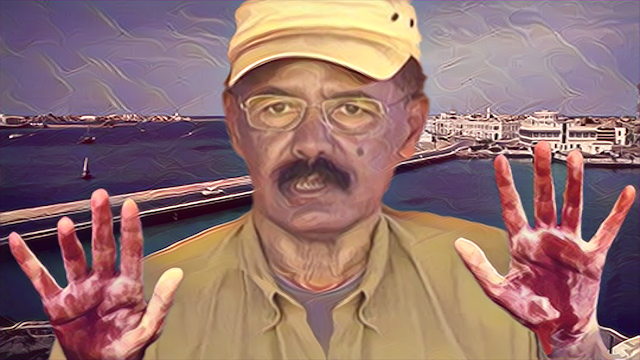Eritrean Leader’s Sandcastle Play

Eritrean president Isaias Afewerki recently ventured out of his hideout at Adi Halo near Asmara to travel to the port city of Massawa for some reflective moments at the beach. [Adi Halo is, of course, the leader’s infamous rural outpost which doubles as his makeshift “presidential office.” The place has an even more bizarre history of having started off as his “site office” for a construction project involving a micro dam he designed and went on to oversee its construction — all while wielding an iron grip over the country!]
A Dictator’s Own Little World
1- Egotism and Spitefulness
Having been chauffeured to his bungalow on the coast in a few short hours, the autocratic leader headed straight for his private beach. There—clad in his trademark outfit of flannel pants, oversized khaki shirt, and baseball hat–he stood barefoot on the warm sand near the water’s edge and, hands on hips, scanned his surroundings. For a moment, he remained motionless as he gazed out fixedly at the shoreline overwhelmed by the thought of unfathomable quantities of beach sand extending up and down the coast as far as the eye can see.
The thought ignited in his mind a flash of anger over his inability to have this endless resource exploited as raw material for developing a stock of weapons that he could employ to vanquish his enemies, subdue his rivals, and impose political dominance over the region. These fantasy scenarios are, in fact, elements of an obsessive ambition that he has doggedly pursued for nearly half a century. He does so, seemingly, unfazed by the prevalent notion that his ‘vision’ is logically apt to lead to self-destruction rather than self-fulfillment.
2- Deceit at Every Turn
Curiously, it did not take him long to snap out of his angry mood, thanks to his whimsical decision to temporarily get off his high horse and find solace in the harmless prospect of using some of the beach sand to build sandcastles. That’s right, he resolved to build sandcastles with it instead! — hoping the pastime will allow him to relive, even if just for a fleeting moment. the innocence of childhood. It also appeared to him that the puerile joy to be derived from the activity would be doubled if he could get his friend, the Ethiopian prime minister to join in. So, he immediately reached out to Abiy Ahmed requesting his company, and the latter obliged by flying out to Massawa the next day.
Having made adequate preparations in the morning of the third day, the strange bedfellows set off for the beach equipped with essential tools and supplies, and began work on building their respective sandcastles in the early afternoon. Enlivened by the soothing sound of waves breaking in the distance, the main task proceeded to completion without a hitch. Over essentially the same length of time, the young, energetic Abiy managed to build a fairly large and somewhat elaborate castle while the aging, enfeebled Isaias had to settle for a much smaller and simpler one.
Finally, they had to build defensive (or curtain) walls as the last step before wrapping up the activity. So, Isaias cunningly proposed putting up a single wall to enclose both castles knowing full well that: (i) most of the labor for it would be provided by Abiy and (ii) he (Isaias) would end up owning an equal share in the “joint property” acquired with their unequal inputs — a sly, exploitative scheme of maximizing returns on minimal investment!
3- The Fear Within
Taking no objection to the proposal, Abiy Ahmed got down to work with vigor and had, pretty much on his own, managed to complete nearly half of the wall construction when fate struck. Suddenly, a tsunami — triggered by an earthquake beneath the Red Sea floor — hit the coast and violently swept the duo away as its 20-foot-high waves devastated everything in their path. At precisely that very moment, Isaias was jolted up from his sleep by the shock of the imaginary disaster only to realize that the whole experience was just a DREAM! He pulled himself up on his bed and, after a quick mental rerun of the dream, he ruminated on what it all meant. Deeply anguished that the dream may be a harbinger of a personal disaster destined to befall him, he wondered if his fellow long-time dictator President Idriss Déby of Chad had had a similar dream in the run up to his demise last April!
In the Realm of Reality
Conceptually, the simplistic dream-world of dictators stands in stark contrast to the world of objective reality where issues rarely, if ever, lend themselves to easy analysis and prediction. The question of the Eritrean dictator’s future and ultimate fate is no different. However, a review of the man’s personal traits, past history, decisions and performance record does provide a rational basis for prognostication of what the future may hold for him.
1- Despotism, Belligerence & International Isolation
President Isaias Afewerki had, early in his continuing 30-year tenure in power, steered Eritrea toward a tyrannical one-man system whose domestic governance is marked by repression, human rights violations, militarism and party-dominated command economy. This has been paired with a foreign policy of confrontation where use of force is the instrument of choice for dealing with issues of disagreement.
Isaias’s long rule has exposed his uniquely cruel and tyrannical nature and revealed his capacity for roguery and belligerence. Yet, through it all, he has managed not only to thwart periodic domestic challenges to his autocracy, but to largely escape liability for the detriments that his political brinkmanship and military adventurism inflicted on the region. Emboldened by these experiences, the dictator has, in the past few years, continued to project an air of invincibility in his actions and behavior. This may be a reflection of his illusory sense of security or just a put-up of a brave front designed to unnerve his enemies.
Whatever its cause, this pseudo-invincibility has been at the center of the leader’s interventionism and militarism that threaten to destabilize the region. Isaias tries to reinforce this false image by pretending to have a political instinct for ‘sensing’ danger — a ruse he often uses to gloomily forecast disasters bound to strike his adversaries while remaining blind to his own vulnerability to those same vagaries of fate.
2- ‘The Last Straw’?
Demonizing adversaries and predicting doom and gloom for them is a weapon that President Isaias often uses to whip up pro-PFDJ Eritreans abroad and his foreign collaborators into a frenzy over an exaggerated threat thereby affording them a rallying point for military confrontation. His latest act of such political chicanery is the infamous “Woyane: Game Over!” statement that he declared in June 2018 — a statement of intent couched in his usual warmongering parlance! His diaspora supporters and Ethiopian allies were quick to turn that bellicose rhetoric into sloganeering designed to pave the way for military attack on TPLF which was eventually launched in November 2020.
As the war progressed, TPLF proved to be a formidable fighting force capable of holding out against its allied enemies much longer than the latter had planned for. Media reports on mounting civilian casualties, widespread devastation and grievous human suffering prompted the international community to apply increasing pressure on Eritrea to withdraw from Tigray. At first, President Isaias floated a potential deal of troop withdrawal to be undertaken under international security guarantees. But when the US imposed visa restrictions on key officials of his regime and (along with its European allies) threatened tougher sanctions, he relented and withdrew his forces eight months after they moved in. Eritrean troops subsequently redeployed along their southern border and established fortified defensive positions while the TPLF regained control of Tigray.
It is obvious that whatever Isaias achieved in the war had come at a price — partly immediate, partly deferred — just as was the case with his similar past campaigns. For one thing, a more precarious security situation exists now than had prevailed over the two-and-a-half years preceding the war when TPLF posed no security threat, imminent or otherwise, to Isaias and his regime.
Conclusion
The relentless pursuit of the policies outlined above have earned President Isaias resentment of his people and shunning by the global community with all the diplomatic, political and economic damages it entails. Indeed, he has been gradually sinking in the hole that he not only dug for himself, but strangely chose to deepen from time to time.through his escalating domestic repression and foreign intervention. The ongoing Tigray debacle may perhaps mark the bottoming out of his sinking fortunes. Sadly, this in a nutshell is the legacy of the aging leader.
The current reality for President Isaias is such that the odds are stacked against him — his old age and declining health, the indignation of his own people, the grudges of aggrieved neighboring entities, the exasperation of the international community. There is thus no doubt that the president is in the final twilight moments of his natural and political lives. If history is a guide, Isaias is likely to keep a trick or two up his sleeve that he may pull on his enemies at the ‘right time.’ But even in the best-case scenario of his stratagem succeeding, it may at best buy him a little more time but not avert his inevitable demise.
The sad thing in all this is, while Eritrea’s diaspora opposition squabble among themselves and some even sell themselves to cheerleading for alien political causes, home-grown forces may suddenly rid the county of the tyrannical regime and put a populist government in its place. Overtaken — and rendered largely irrelevant — by such an event, the former may decide to stay within their comfort zone of inept opposition and relegate themselves to playing reactive politics in perpetuity. Should the diaspora opposition opt for such a role, it would be a setback for the struggle but would be irrelevant to the country’s destiny or that of its people!


Awate Forum